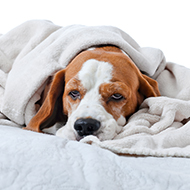Vets declare gastrointestinal disease outbreak in Yorkshire

Findings show that most of the dogs had not visited the beach before getting sick.
Vets investigating a spike of gastrointestinal disease in dogs have declared that levels in Yorkshire are high enough to be considered an outbreak.
The University of Liverpool’s Small Animal Veterinary Surveillance Network (SAVSNET) analysed real-time data from veterinary practices and found that levels of the disease have been statistically higher than expected for three weeks.
“We can therefore call this an outbreak in Yorkshire,” commented Professor Alan Radford, academic lead for SAVSNET. “In other regions, the increases we have seen so far look more like normal seasonal variation. However, such signals can change quickly, and we will continue to monitor the situation.”
SAVSNET began investigating the illness in January following reports of sickness and diarrhoea in dogs after visiting the Yorkshire coast. However, the latest update confirms that most of the dogs (79%) had not visited the beach before getting sick, and many cases were reported inland.
The team analysed data from a questionnaire submitted by vets and owners that revealed that the most commonly reported clinical signs were inappetence, and vomiting and diarrhoea without blood.
Most of the cases (94%) had been vaccinated in the last three years and, of owners who had more than one dog, the majority said other dogs in the household had also shown similar signs, suggesting an infectious cause.
In more positive findings, most dogs seemed to recover within 7-14 days, although more than 60 per cent required treatment of some form. SAVSNET added that no underlying cause was reported, and therefore the aetiology of the outbreak is still unknown.
To further investigate the disease, SAVSNET is calling on people with affected dogs to fill out its questionnaire and for vets with a case that is currently vomiting or experiencing diarrhoea to submit a faecal sample.
SAVSNET project coordinator Bethaney Brant, said that while the cause is still unknown, it is likely to be infectious, and called on vets and owners to handle suspected cases with care.
“Thankfully affected dogs usually make a full recovery with appropriate care and there is no known risk to people," she said. "Owners of suspect cases should contact their veterinary practice for advice.”



 The Veterinary Medicines Directorate (VMD) is inviting applications from veterinary students to attend a one-week extramural studies (EMS) placement in July 2026.
The Veterinary Medicines Directorate (VMD) is inviting applications from veterinary students to attend a one-week extramural studies (EMS) placement in July 2026.